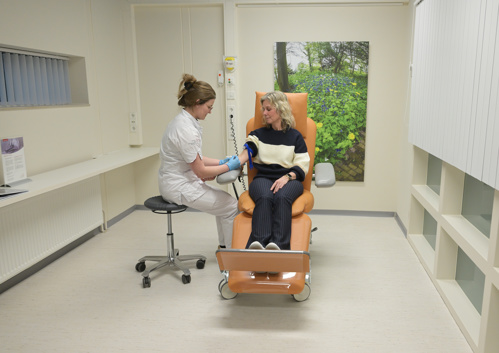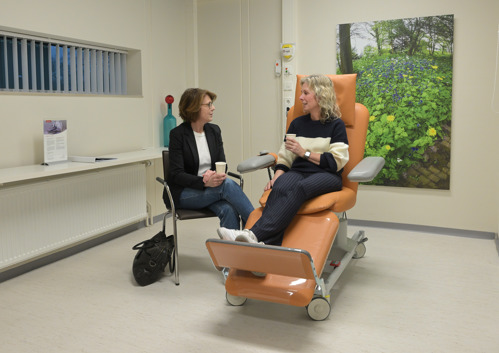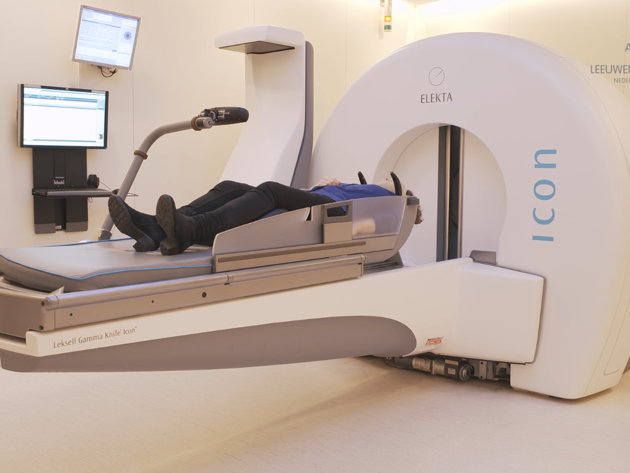Gamma Knife Treatment
The Gamma knife is a radiation device that can be used to irradiate metastases in the head. The irradiation takes place using a large number of radioactive cobalt sources. The device can irradiate very specifically from different angles. The area to be irradiated receives the right dose of radiation and the surrounding healthy tissues are put under as little stress as possible. This will give you fewer side effects. The radiation is aimed at reducing the symptoms of metastases and limiting the further growth of the tumors.
You do not need to be admitted for this treatment. You can go home after the treatment.
More information about your appointment
Outpatient consultation
You will have an outpatient consultation in the radiotherapy department. This is an appointment with your radiation oncologist or a neurosurgeon, in which the treatment is discussed with you. He or she explains the treatment on the Gamma knife. Before this meeting, doctors discuss your data during a multidisciplinary consultation.
After the consultation, we will schedule your treatment. You will usually receive the appointment immediately. Otherwise, a lab technician will call you later to pass on the appointment.

Announce
On the day of the treatment, you report to the reception of the Radiotherapy Department at the agreed time.You will be welcomed by one of the radiotherapy technicians who will guide you during the day.
You will be given a living room on the ward, because the treatment can take all day. A companion is always allowed with you. You can also bring your own food and drinks. Only your lunch will be provided by the department.
For the MRI scan, you will receive an IV in your elbow. Through this infusion you will receive contrast agent for the MRI scan.
Tell the lab technicians if you:
- has a port-a-cath;
- are difficult to prick;
- has previously had a thrombosis arm;
- has ever had an allergic reaction to a contrast agent.

MRI
The Gamma Knife treatment requires a new, clear MRI scan . This allows us to carry out the treatment very precisely. This scan can be made on the day of the radiation or the day before. Before the MRI, you fill in a questionnaire to assess whether you can safely enter the MRI.
Metal in the examination room can cause disturbances in image quality and can also be very dangerous. You will therefore be instructed to remove loose jewelry. Loose dentures and hearing aids also have to be removed. Your clothing must not contain metal.
The MRI scanner makes a lot of noise. You will be provided with earplugs and headphones on to protect your hearing
For this scan, you will receive an IV in your elbow. You will receive contrast medium through this infusion. The contrast agent makes it easier to see abnormalities and blood vessels in the brain. If you have had an allergic reaction to a contrast agent, please report this to the lab technicians.
For the MRI scan, you can eat and drink as usual. You do not need to be fasting for this. While making the scan, it is important that you lie still.
The MRI scan takes 20 to 30 minutes.

Waiting time during radiation
With the MRI scan, we make a radiation plan. This plan states how much radiation you will receive, from which directions, and how long the radiation lasts.
Making the radiation plan can take a while. This is because we take into account the number of tumors, the size of the tumors, and the scheduling of other patients on the same day. While waiting, you will stay in a living room.
When the radiation plan is ready, your practitioner will explain it to you. The doctor will also tell you how long the treatment will take and what medication you will need after the radiation. During this conversation you can also ask questions to the doctor.

Gamma Knife CT Scan
Before the radiation, a CT scan is first made on the Gamma Knife. This scan is made to determine your posture and takes about five minutes. It is important that you remain still.

Side effects
Due to the high precision of the Gamma Knife, the risk of side effects is small.
Most common side effects
In the first days or weeks, usually temporarily:
- Fatigue
- Complaints due to swelling (oedema), for example headache and nausea.
- Temporary complaints after placing the frame:
- Swollen eyelids
- Sensitivity or numbness of the scalp
After a few months:
- Radiation necrosis: an inflammation that occurs when tumor cells are cleared. You can be given medication for this.
- Hair loss*
- Memory loss or dementia*
*These side effects are very rare.
Aftercare and check-up
At the end of your radiation treatment, you will remain under control for a while. If you have any questions about side effects, medication or the periodic MRI scan, you can always reach us on 020 512 9111. Then ask for the Radiotherapy department.
 nl
nl

